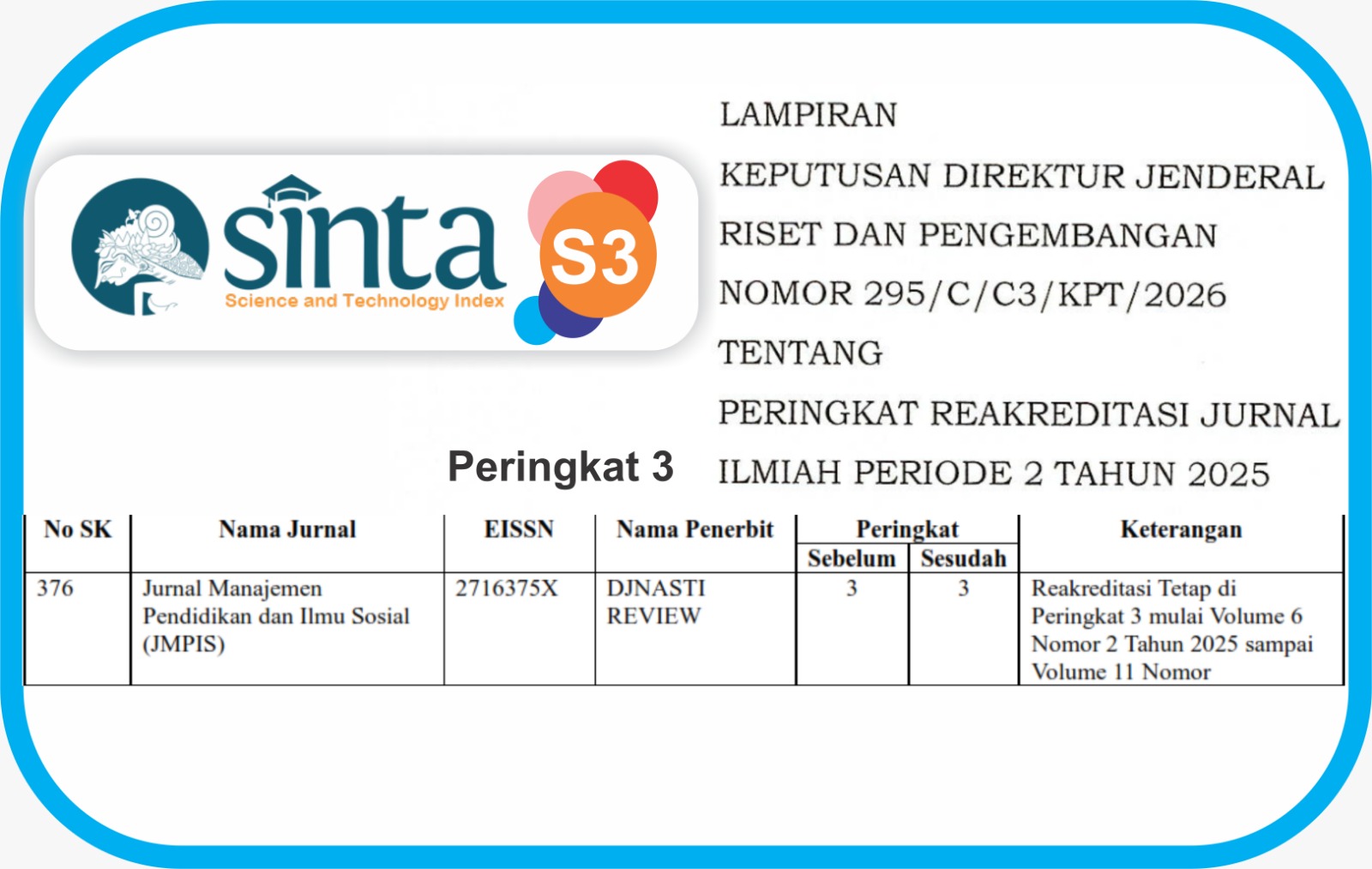Membangun Keterlibatan Pelanggan Melalui Pemasaran Media Sosial pada Merek 3Second: Ekuitas Merek dan Kepercayaan Merek Sebagai Variabel Mediasi
DOI:
https://doi.org/10.38035/jmpis.v6i1.3427Keywords:
Pemasaran Media Sosial, Keterlibatan Pelanggan, Ekuitas Merek, Kepercayaan Merek, Model S-O-RAbstract
Dalam era digital, pemasaran media sosial telah menjadi strategi utama yang digunakan berbagai merek untuk meningkatkan keterlibatan pelanggan. Penelitian ini bertujuan untuk menganalisis dampak aktivitas pemasaran media sosial terhadap keterlibatan pelanggan pada merek 3Second, dengan ekuitas merek dan kepercayaan merek sebagai variabel mediasi. Menggunakan pendekatan model Stimulus-Organism-Response (S-O-R), penelitian ini berfokus pada 150 responden yang merupakan pengikut akun Instagram 3Second dan telah melakukan pembelian produk. Metode yang digunakan adalah Partial Least Squares Structural Equation Modeling (PLS-SEM) untuk menguji hubungan antar variabel. Hasil penelitian menunjukkan bahwa aktivitas pemasaran media sosial memiliki pengaruh positif signifikan terhadap ekuitas merek dan kepercayaan merek, yang selanjutnya meningkatkan keterlibatan pelanggan. Temuan ini memberikan wawasan strategis bagi pelaku bisnis dalam memaksimalkan efektivitas pemasaran media sosial untuk membangun hubungan yang lebih kuat dengan pelanggan.
References
second. (2024). Profil, Visi, Misi 3Second, Brand Lokal yang Go-Internasional! https://3second.co.id/blog/stories/inilah-profil-3second-brand-lokal-yang-go-internasional
Afiftama, I., & Nasir, M. (2024). The Effect of Brand Image, Brand Trust and Customer Experience on Brand Loyalty. Jurnal Ilmiah Manajemen Kesatuan, 12(1), 191–202. https://doi.org/10.37641/jimkes.v12i1.2403
Agyei, J., Sun, S., Abrokwah, E., Penney, E. K., & Ofori-Boafo, R. (2020). Influence of Trust on Customer Engagement: Empirical Evidence From the Insurance Industry in Ghana. SAGE Open, 10(1). https://doi.org/10.1177/2158244019899104
Ananda, A. S., Hernández-García, Á., Acquila-Natale, E., & Lamberti, L. (2019). What makes fashion consumers “click”? Generation of eWoM engagement in social media. Asia Pacific Journal of Marketing and Logistics, 31(2), 398–418. https://doi.org/10.1108/APJML-03-2018-0115
Barger, V., Peltier, J. W., & Schultz, D. E. (2016). Social media and consumer engagement: A review and research agenda. Journal of Research in Interactive Marketing. Tsunami Hazard: A Practical Guide for Tsunami Hazard Reduction. https://doi.org/http://dx.doi.org/10.1108/JRIM-06-2016-0065
B?LG?N, Y. (2018). the Effect of Social Media Marketing Activities on Brand Awareness, Brand Image and Brand Loyalty. Business & Management Studies: An International Journal, 6(1), 128–148. https://doi.org/10.15295/bmij.v6i1.229
Brodie, R. J., Ilic, A., Juric, B., & Hollebeek, L. (2013). Consumer engagement in a virtual brand community: An exploratory analysis. Journal of Business Research, 66(1), 105–114. https://doi.org/10.1016/j.jbusres.2011.07.029
Bruce Louise Rich, Jeffrey, LepineEean, A., & Crawford, R. (2010). JOB ENGAGEMENT: ANTECEDENTS AND EFFECTS ON JOB PERFORMANCE. 53(3), 617–635.
Casaló, L. V., Flavián, C., & Ibáñez-Sánchez, S. (2017). Understanding Consumer Interaction on Instagram: The Role of Satisfaction, Hedonism, and Content Characteristics. Cyberpsychology, Behavior, and Social Networking, 20(6), 369–375. https://doi.org/10.1089/cyber.2016.0360
Dwivedi, A., & McDonald, R. E. (2020). Examining the efficacy of brand social media communication: a consumer perspective. Journal of Marketing Theory and Practice, 28(4), 373–386. https://doi.org/10.1080/10696679.2020.1768870
Ebrahim, R. S. (2020a). The Role of Trust in Understanding the Impact of Social Media Marketing on Brand Equity and Brand Loyalty. Journal of Relationship Marketing, 19(4), 287–308. https://doi.org/10.1080/15332667.2019.1705742
Ebrahim, R. S. (2020b). The Role of Trust in Understanding the Impact of Social Media Marketing on Brand Equity and Brand Loyalty. Journal of Relationship Marketing, 19(4), 287–308. https://doi.org/10.1080/15332667.2019.1705742
Felix, R., Rauschnabel, P. A., & Hinsch, C. (2017). Elements of strategic social media marketing: A holistic framework. Journal of Business Research, 70, 118–126. https://doi.org/10.1016/j.jbusres.2016.05.001
Godey, B., Manthiou, A., Pederzoli, D., Rokka, J., Aiello, G., Donvito, R., & Singh, R. (2016). Social media marketing efforts of luxury brands: Influence on brand equity and consumer behavior. Journal of Business Research, 69(12), 5833–5841. https://doi.org/10.1016/j.jbusres.2016.04.181
Habibi, M. R., Laroche, M., & Richard, M. O. (2014). The roles of brand community and community engagement in building brand trust on social media. Computers in Human Behavior, 37, 152–161. https://doi.org/10.1016/j.chb.2014.04.016
Hafez, M. (2021). The impact of social media marketing activities on brand equity in the banking sector in Bangladesh: the mediating role of brand love and brand trust. International Journal of Bank Marketing, 39(7), 1353–1376. https://doi.org/10.1108/IJBM-02-2021-0067
Hair, J. F., Hult, G. T., Ringle, C., & Sarstedt, M. (2017). A Primer on Partial Least Squares Structural Equation Modeling (PLS-SEM) - Joseph F. Hair, Jr., G. Tomas M. Hult, Christian Ringle, Marko Sarstedt. In Sage.
Hair, J. F., Sarstedt, M., Hopkins, L., & Kuppelwieser, V. G. (2014). Partial least squares structural equation modeling (PLS-SEM): An emerging tool in business research. European Business Review, 26(2), 106–121. https://doi.org/10.1108/EBR-10-2013-0128
Han, S. H., Nguyen, B., & Lee, T. J. (2015). Consumer-based chain restaurant brand equity, brand reputation, and brand trust. International Journal of Hospitality Management, 50, 84–93. https://doi.org/10.1016/j.ijhm.2015.06.010
Haudi, Handayani, W., Musnaini, Suyoto, Y. T., Prasetio, T., Pital-Oka, E., Wijoyo, H., Yonata, H., Koho, I. R., & Cahyono, Y. (2022). The effect of social media marketing on brand trust, brand equity and brand loyalty. International Journal of Data and Network Science, 6(3), 961–972. https://doi.org/10.5267/j.ijdns.2022.1.015
Henseler, J., Ringle, C. M., & Sarstedt, M. (2015). A new criterion for assessing discriminant validity in variance-based structural equation modeling. Journal of the Academy of Marketing Science, 43(1), 115–135. https://doi.org/10.1007/s11747-014-0403-8
Ibrahim, B., Aljarah, A., & Ababneh, B. (2020). Do Social Media Marketing Activities Enhance Consumer Perception of Brands? A Meta-Analytic Examination. Journal of Promotion Management, 26(4), 544–568. https://doi.org/10.1080/10496491.2020.1719956
Ibrahim, B., Aljarah, A., & Sawaftah, D. (2021). Linking social media marketing activities to revisit intention through brand trust and brand loyalty on the coffee shop facebook pages: Exploring sequential mediation mechanism. Sustainability (Switzerland), 13(4), 1–16. https://doi.org/10.3390/su13042277
Islam, J., & Rahman, Z. (2017). The impact of online brand community characteristics on customer engagement: An application of Stimulus-Organism-Response paradigm. Telematics and Informatics, 34(4), 96–109. https://doi.org/10.1016/j.tele.2017.01.004
Ismail, A. R. (2017). The influence of perceived social media marketing activities on brand loyalty: The mediation effect of brand and value consciousness. Asia Pacific Journal of Marketing and Logistics, 29(1), 129–144. https://doi.org/10.1108/APJML-10-2015-0154
Jacoby, J. (2002). Stimulus-organism-response reconsidered: An evolutionary step in modeling (consumer) behavior. Journal of Consumer Psychology, 12(1), 51–57. https://doi.org/10.1207/153276602753338081
Kanwal, S., Ullah, D. S., Ismail, U., & Raf, D. N. (2024). Impact of Social Media Marketing on Customer Engagement: Promoting Electronic Word of Mouth Intentions in the Online Fashion Apparel Brands. 1(3), 4–6.
Khadim, R. A., Hanan, M. A., Arshad, ., & Saleem, N. (2018). Revisiting antecedents of brand loyalty: Impact of perceived social media communication with brand trust and brand equity as mediators.
Kim, A. J., & Ko, E. (2012). Do social media marketing activities enhance customer equity? An empirical study of luxury fashion brand. Journal of Business Research, 65(10), 1480–1486. https://doi.org/10.1016/j.jbusres.2011.10.014
Kim, J. H., & Hyun, Y. J. (2011). A model to investigate the influence of marketing-mix efforts and corporate image on brand equity in the IT software sector. Industrial Marketing Management, 40(3), 424–438. https://doi.org/10.1016/j.indmarman.2010.06.024
Koay, K. Y., Ong, D. L. T., Khoo, K. L., & Yeoh, H. J. (2021). Perceived social media marketing activities and consumer-based brand equity?: Testing a moderated mediation model. Asia Pacific Journal of Marketing and Logistics, 33(1), 53–72. https://doi.org/10.1108/APJML-07-2019-0453
Kock, N. (2015). Common method bias in PLS-SEM: A full collinearity assessment approach. International Journal of E-Collaboration, 11(4), 1–10. https://doi.org/10.4018/ijec.2015100101
Kosiba, J. P., Boateng, H., Okoe, A. F., & Hinson, R. (2020). Trust and customer engagement in the banking sector in Ghana. Service Industries Journal, 40(13–14), 960–973. https://doi.org/10.1080/02642069.2018.1520219
Kunz, W., Aksoy, L., Bart, Y., Heinonen, K., Kabadayi, S., Ordenes, F. V., Sigala, M., Diaz, D., & Theodoulidis, B. (2017). Customer engagement in a Big Data world. Journal of Services Marketing, 31(2), 161–171. https://doi.org/10.1108/JSM-10-2016-0352
Lee, D., Moon, J., Kim, Y. J., & Yi, M. Y. (2015). Antecedents and consequences of mobile phone usability: Linking simplicity and interactivity to satisfaction, trust, and brand loyalty. Information and Management, 52(3), 295–304. https://doi.org/10.1016/j.im.2014.12.001
Liu, X., Shin, H., & Burns, A. C. (2021). Examining the impact of luxury brand’s social media marketing on customer engagement: Using big data analytics and natural language processing. Journal of Business Research, 125(January 2018), 815–826. https://doi.org/10.1016/j.jbusres.2019.04.042
Pentina, I., Guilloux, V., & Micu, A. C. (2018). Exploring Social Media Engagement Behaviors in the Context of Luxury Brands. Journal of Advertising, 47(1), 55–69. https://doi.org/10.1080/00913367.2017.1405756
Puspaningrum, A. (2020). Social Media Marketing and Brand Loyalty: The Role of Brand Trust. Journal of Asian Finance, Economics and Business, 7(12), 951–958. https://doi.org/10.13106/JAFEB.2020.VOL7.NO12.951
Roets, C. R. Q., Bevan-Dye, A. L., & Viljoen, W. P. (2014). Influence of social image and brand trust on mobile phone brand equity amongst African generation y students. Mediterranean Journal of Social Sciences, 5(21), 75–84. https://doi.org/10.5901/mjss.2014.v5n21p75
Sanny, L., Arina, A. N., Maulidya, R. T., & Pertiwi, R. P. (2020). Purchase intention on Indonesia male’s skin care by social media marketing effect towards brand image and brand trust. Management Science Letters, 10, 2139–2146. https://doi.org/10.5267/j.msl.2020.3.023
Saputro, E. P., & Setyaningrum, D. P. (2023). The Impact of Brand on Purchasing Decisions. Journal of Supply Chain Management, 3(1), 30–38. https://journal.lembagakita.org/index.php/IJMSIT/article/download/879/685
Sarstedt, M., Ringle, C. M., Cheah, J. H., Ting, H., Moisescu, O. I., & Radomir, L. (2020). Structural model robustness checks in PLS-SEM. Tourism Economics, 26(4), 531–554. https://doi.org/10.1177/1354816618823921
Schivinski, B., & Dabrowski, D. (2016). The effect of social media communication on consumer perceptions of brands. Journal of Marketing Communications, 22(2), 189–214. https://doi.org/10.1080/13527266.2013.871323
Seo, E. J., & Park, J. W. (2018). A study on the effects of social media marketing activities on brand equity and customer response in the airline industry. Journal of Air Transport Management, 66(August 2017), 36–41. https://doi.org/10.1016/j.jairtraman.2017.09.014
Seo, E. J., Park, J. W., & Choi, Y. J. (2020). The effect of social media usage characteristics on e-WOM, trust, and brand equity: Focusing on users of airline social media. Sustainability (Switzerland), 12(4), 1–18. https://doi.org/10.3390/su12041691
So, C., Fung, K. K., Beverley, K., Sparks, A., & Wang, Y. (2016). Journal of Service Management Enhancing customer relationships with retail service brands: the role of customer engagement Article information:"Enhancing customer relationships with retail service brands: the role of customer engagement". Journal of Service Management, 27. http://dx.doi.org/10.1108/
Statista. (2023). Number of social media users worldwide from 2017 to 2027. https://www.statista.com/statistics/278414/number-of-worldwide-social-network-users/
Statista. (2024a). Daily time spent on social networking by internet users worldwide from 2012 to 2024. https://www.statista.com/statistics/433871/daily-social-media-usage-worldwide/
Statista. (2024b). Instagram - statistik & fakta. https://www.statista.com/statistics/183585/instagram-number-of-global-users/
van Tonder, E., & Petzer, D. J. (2018). The interrelationships between relationship marketing constructs and customer engagement dimensions. Service Industries Journal, 38(13–14), 948–973. https://doi.org/10.1080/02642069.2018.1425398
Widiyana, H., & Nasir, M. (2024). the Influence of Brand Characteristics and Brand Satisfaction on Brand Loyalty With Brand Trust As a Mediating Variable on Ms Glow Products in Soloraya. Jursima, 11(2), 370–384. https://doi.org/10.47024/js.v11i2.739
Yoo, B., & Donthu, N. (2001). Developing and validating a multidimensional consumer-based brand equity scale. Journal of Business Research, 52(1), 1–14. https://doi.org/10.1016/S0148-2963(99)00098-3
Yu, X., & Yuan, C. (2019). How consumers’ brand experience in social media can improve brand perception and customer equity. Asia Pacific Journal of Marketing and Logistics, 31(5), 1233–1251. https://doi.org/10.1108/APJML-01-2018-0034
Zhao, L., Lee, S. H., & Copeland, L. R. (2019). Social media and Chinese consumers’ environmentally sustainable apparel purchase intentions. Asia Pacific Journal of Marketing and Logistics, 31(4), 855–874. https://doi.org/10.1108/APJML-08-2017-0183
Downloads
Published
How to Cite
Issue
Section
License
Copyright (c) 2024 Muhammad Fauzy, Aflit Nuryulia Praswati

This work is licensed under a Creative Commons Attribution 4.0 International License.
Hak cipta :
Penulis yang mempublikasikan manuskripnya di jurnal ini menyetujui ketentuan berikut:
- Hak cipta pada setiap artikel adalah milik penulis.
- Penulis mengakui bahwa Jurnal Manajemen Pendidikan dan Ilmu Sosial (JMPIS) berhak menjadi yang pertama menerbitkan dengan lisensi Creative Commons Attribution 4.0 International (Attribution 4.0 International CC BY 4.0) .
- Penulis dapat mengirimkan artikel secara terpisah, mengatur distribusi non-eksklusif manuskrip yang telah diterbitkan dalam jurnal ini ke versi lain (misalnya, dikirim ke repositori institusi penulis, publikasi ke dalam buku, dll.), dengan mengakui bahwa manuskrip telah diterbitkan pertama kali di Jurnal Manajemen Pendidikan dan Ilmu Sosial (JMPIS).











































































